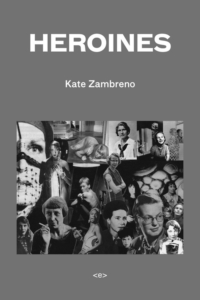 Kate Zambreno’s literary history-memoir Heroines is a work so full of fighting voices and channelled pasts, that to discuss it thoroughly, it seemed one mind would simply not be enough. Over the next several days, we will post an exchange between Jesse Miller (reviews editor), Annie Rebekah Gardner (writer), and Helen Stuhr-Rommereim (contributing editor), discussing the book. Please continue to check back to share in the conversation.
Kate Zambreno’s literary history-memoir Heroines is a work so full of fighting voices and channelled pasts, that to discuss it thoroughly, it seemed one mind would simply not be enough. Over the next several days, we will post an exchange between Jesse Miller (reviews editor), Annie Rebekah Gardner (writer), and Helen Stuhr-Rommereim (contributing editor), discussing the book. Please continue to check back to share in the conversation.
Dear Jesse and Annie,
I’m looking forward to hashing out this book with both of you! I suspect that few readers will have an uncomplicated reaction to Heroines, and for me there was a lot to admire, a lot that excited and informed, and also a lot that infuriated. So, to launch our conversation, I’m going to throw in your direction some things that I loved about Heroines, and some other things that I did not.
By way of introduction, Heroines is the stream-of-consciousness history of a large cast of marginalized female writers and would-be writers of the Modernist era, from Zelda Fitzgerald and Jane Bowles to Anna Kavan and Jean Rhys, all intertwined with Zambreno’s own history of herself as suffering literary woman. The book reads like a combination of novel and manifesto. Whatever its faults, I’m not sure where else this particular history has been written, and it left me with about 15 books to add to my Goodreads “To-Read” shelf.
While I know it’s tired to call things performative these days, I couldn’t help but feel that in a variety of ways the book constituted quite an impressive performance. In a recent interview, Chris Kraus (who was the editor of this book) referred to her epistolary novel I Love Dick as a “stand up routine.” It’s a funny way to think about a seemingly confessional piece of writing, but it evokes a good image, and although Heroines isn’t funny, it carries a sense of vigorous recitation. It’s a performance of knowledge, a virtuosic delivery of the minute life details of an impressive number of forgotten women, cases of tragically squandered potential.
But Zambreno also plays a part in the novel, performing herself as marginalized literary wife. It feels appropriate that she would place herself among the women that have so subsumed her life and work, but it was this character that I found to be the most frustrating part of Heroines. She describes herself living in Akron, Ohio, feeling crazy and alone in her house all day, going out only to eat at the one restaurant in town with a vegan option (oh my!), or get her eyebrows badly waxed at a sub-par rural salon (she should have known they’d mess it up in Ohio!). She’s seemingly offended to be relegated to this Middle America mundanity, and that was an attitude that I found profoundly annoying. This particular brand of alienation has a lot to do with class, and very little to do with the systematic silencing of female voices in literature, and she could have written about it without being so obnoxious and dismissive.
But now I’ve gotten that out of my system, another complaint: Heroines left me feeling a little alienated myself.
Of herself and her female writer companions, Zambreno writes, “We are messy, intense, stressed, difficult, anxious, depressed. We are toxic, fucked up.”
I am never hysterical, and no one will ever even accidentally diagnose me with bipolar disorder. Does that mean I can’t be a writer, or don’t write like a woman? Madness is a key issue in Zambreno’s narrative, and by her account the great wrong that’s been done to women in literature is that women’s particular madness has simply been seen as madness, and not genius. Women’s eccentricity has been pathologized.
I think one issue here might be that Zambreno is actually talking about a particular kind of female character, both literary and historical, and a particular kind of writing. And more than glorifying madness itself, I think Zambreno is desperately, emotionally attempting to rehabilitate a generation of women whose legacy the machinations of history have left terribly deformed.
Again, echoing Chris Kraus, who in I Love Dick asked “Who gets to speak and why,” Zambreno writes, “It all comes down to who gets to name . . . The madwomen of modernism have been named — diagnosed — and this diagnosis . . . has been endlessly repeated through how they have been documented, written about, and read.”
So many thoughts, and we haven’t even started talking about Zelda!
Helen
***
Helen,
Thanks for starting this off. You’ve raised so many interesting points about Heroines that I hardly know where to begin. I was kind of daunted by the prospect of determining a particular path to forge through Zambreno’s book, and I think this dialogic format is the best way to approach a work so rich in ideas, in stories seldom told, and in complications and contradictions.
I want to start by highlighting the multi-valenced character of the book because I think it’s useful for framing any points of praise or critique we may begin to work out. You suggest that Heroines is a performative text, a kind of hybrid of diaristic confession and literary lecture, and I wonder what you and Annie think about the way Zambreno’s notion of possession complicates this idea of performance.
To me, performance (of, for example, the well-trained actor) suggests a degree of self-control that Zambreno clearly wants to call into question. If Heroines is a performance, it is a performance of possession. She writes of the process of composing Heroines, of rehabilitating the “mad wives” of canonical literary modernists, “I begin to cannibalize these women, literally incorporating them, their traumas, an uncanny feeling of repeating, of reliving.” Here I think we see many of the different and often contradictory ways that possession works in the text coming into focus.
For instance, we have possession as a kind of séance, an experience of communion with women whom she feels history has attempted to spirit away, to erase. Possession in this sense is a method Zambreno uses to save these women from obscurity and also as an acknowledgement of the similarity between their position within a patriarchal society and her own. In this sense, possession is a mode of challenge to canonical history.
But possession also takes the form of immersion in ideological scripts as well, a repetition of predetermined gender roles. So if in some senses Zambreno praises possession, in other senses she resists it. She recognizes the overzealousness of the analogies she draws between her life and those she discusses. “For I must remember,” she writes, “John [Zembreno’s partner] is not Tom Eliot. John is not Leonard Woolf. We might slip into these roles, we might play these ghosts, but we have become aware of this. Even if we cannot control ourselves at the time. I attempt to use language. I point out his invalidating rhetoric. He tries to listen. We try to learn.”
And there is also the more ambivalent possession we see in emotions, the way they have of taking over, arising beyond conscious control, seemingly dragging minds and bodies along for the ride. Do these extreme emotions, of depression, of anger, of love, of alienation, of obsession, signify a rebellion against gender oppression, the chemical raging of hormones, or the side effects of prescribed psychotropic medications?
And finally there is possession as puppeteering or ventriloquization, the process of speaking for others, of appropriating their experience, using it as raw material. Zambreno levels heavy criticism at F. Scott Fitzgerald, Gustave Flaubert, T.S. Eliot, and James Joyce, among others, for this form of literary possession, which she sees as implicated in silencing and suppressing the lived and written lives of wives, daughters, and lovers. Of course, to some degree, Zambreno is guilty of this mode of possession as well, in the way she strategically narrates other people’s lives, aligning them with her own. There is something distinctively violent in her own language of cannibalization and incorporation that rests uneasily with the nurturing empathy she expresses towards Zelda Fitzgerald, Vivien(ne) Eliot, and others, elsewhere.
By suggesting that Zambreno is “guilty” of the act of possession, I’ve weighted the term negatively against her, but I think there is a live, unanswered ethical question here about when it is or isn’t ok to speak for others. It’s easy to praise Heroines for its rebellion against canonical history or to deride it for its own violences. Heroines resists both moves. Within, Zambreno makes arguments, but she also records her uncertainties and insecurities, the planned séances and the reflexive jerks of the pen. So I wonder how important you guys see the contradictions and shifts in opinion that take place in Heroines. What effect do they have on the seemingly straightforward arguments Zambreno wants to make (about gender and psychiatry, about autobiographical writing, about appropriation)? Strengthen them? Weaken them? Suggest that Heroines is doing something else entirely than making an argument?
Jesse
This post may contain affiliate links.








